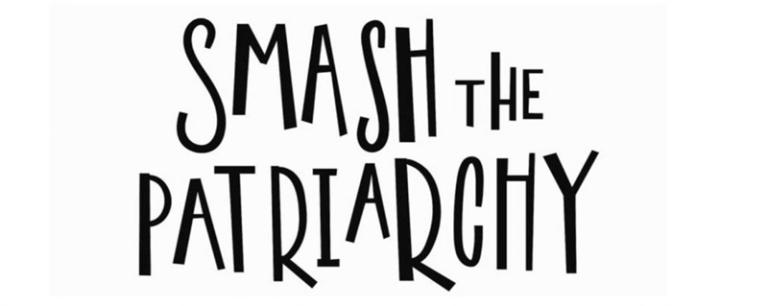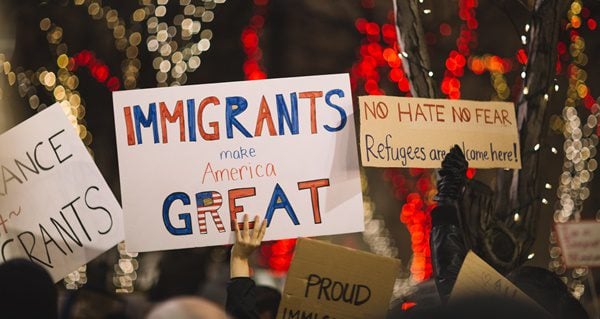 A Cultural Apocalypse
A Cultural Apocalypse
We are on the brink of a cultural apocalypse. Courageous women and men sharing their stories through the #MeToo campaign are pulling back the veil on the seedy undercurrent of sexual violence permeating our culture. The patriarchy is collapsing under its own oppressive weight as people refuse to prop it up any longer.
An apocalypse is a revelation of truth after the veneer of myth is stripped away. Myth glosses over ugly reality like a white-washed tomb. In the case of toxic patriarchy, the myth has been unraveling little by little for a long time. But now it is coming crashing down as men of prestige and influence are being exposed for their abuses of power over people who were vulnerable in relation to them. The “man’s world, boys-will-be-boys” status quo is finally beginning to dissipate. As “all the poisons that lurk in the mud hatch out,” my hope that the disease of toxic, violent sexism and abuse can be exposed, treated, and ultimately healed. The deadly silence that imprisoned victims for so long is disintegrating; may the truth set all of us free.
Facing Our Fears
Ultimately, an apocalypse unleashes hope, but also fear. The constant revelations of sex abuse scandals can trigger unbearable emotions and memories in some who have experienced similar harm. For others, the vast pervasiveness of this abuse is frightening. As someone who has not experienced sexual abuse, the #MeToo campaign has been eye-opening in a way that brings hope and devastation all at once. The abuse coming to light is a good thing, the women and men breaking through walls of shame to tell their stories are an inspiration. Yet I find myself worrying for my daughters (more so than myself, although harassment and abuse can occur regardless of age or marital status), thinking that I have been naïve about the extent to which men believe themselves to be entitled over women (it must be more than I imagined). The revelation of truth is frightening.
However, there is another set of fears among some people, mostly men. I have seen these fears particularly in the Girardian circles with which I am acquainted. As one famous man after another is accused of sexual harassment, I am seeing people frightened by the way a reputation is jeopardized by these accusations. Phrases like “Believe women” are being taken as encouragement of mob mentality that doesn’t leave any benefit of the doubt for the accused. People are afraid that the judicial standard of “innocent until proven guilty” will not be applied to those suspected of abuse. There is a fear of vengeance, lack of forgiveness, and rejection of redemption. These fears must be addressed, because once they are allayed, those who hold them can become better allies in the struggle to transform patriarchy into an equality based on respect and compassion.
How Misapplication of Mimetic Theory May Fuel Fear
René Girard’s mimetic theory sheds light on the way violence begets violence and the way enemies can mirror each other in violent tactics. His great insight about human conflict is that, as much as we wish to distinguish ourselves from our adversaries, much of our conflict stems from our shared desires. When desires align and rivals compete over those desires with tactics that grow progressively ruthless, they can be said to be “mimetic doubles.” The moral distinctions we try to make to elevate ourselves over and against our enemies are lost in judgment and violence. Sometimes, the violence utterly consumes all involved. Other times, warring parties find a way out of the violence, either through uniting against a scapegoat – an outsider who may be or may not be guilty of crimes but who is not to blame for the entirety of the conflict – or through forgiving each other and working out their conflict with patience and mercy.
Mimetic rivalry is a pattern of human conflict that manifests itself in myriad ways from personal relationships to political campaigns to wars between nations. And those who study mimetic theory can be particularly adept at seeing the shared desires between rivals, the all-consuming nature of violence, the proclivity of people to rally together against scapegoats, and the desperate need we all have for forgiveness.
With this in mind, I hear some of the concerns of some (not all) men acquainted with mimetic theory and I feel as though I understand. As story after story comes out, people are warning against a rush to judgment. As the dam of silence breaks open and more and more women express the pain, anger, and frustration we have felt over generations of being taken advantage of or for granted, as each new story triggers new feelings of mingled hope and fear, some are wary that the anger could rally people, mob-like, against an accused person or men in general. There is a lot of concern that we are not hearing more messages of mercy or leaving room for redemption. I even sense that some fear that those of us who want to smash the patriarchy want to replace it with matriarchy, a different hierarchy that subordinates men under women.
Allaying Concerns
I can see how these concerns may stem from misapplications of mimetic theory. I do not want to belittle them, but I do want to allay them. If the changing world has you wary that women are out for vengeance, that innocent men will get swept away in floods of anger, and that even guilty men should be considered redeemable, I want to meet you with understanding. But I ask you to examine your concerns in a new light, recognize the way these fears can reinforce a patriarchal status-quo that hurts women and men, and redirect your concerns toward helping to build a world beyond misogyny, patriarchy, and victimization.
Fears cannot be easily dismissed, but must be worked through. Women who come forward to tell their stories are working through their fears to assert their dignity. Even as tides of sympathy turn toward them, they still face a barrage of shaming questions, rationalizations of the behaviors of the men who hurt them, the risk of their story not being believed, the risk of their hurt made light of. Men who fear false accusation, I hope you can work through your fears as well. The truth is, less (possibly much less) than 10 percent of rape allegations turn out to be false. Although false allegation is not unheard of, it is exceedingly rare. On the other hand, a fear of having one’s accusation disbelieved is significant enough to keep some women from telling their stories. Women are so often dismissed as emotional or irrational, and patriarchal cultures worldwide have a problem taking women seriously. The fear that women will make false allegations increases a societal distrust of women and reinforces the patriarchy. So please, men, work through this fear, even as women work through theirs. The risk that a woman would make herself so vulnerable for a lie pales in comparison to the risk of keeping the distrust of women alive.
More concerning to me than the fear of false allegation, however, is the fear I have seen that some men assume women are out for vengeance. Seeing all the pain and anger women are expressing, I have seen some men express a fear that women want to make men pay. This encompasses the fear of false allegation, but extends beyond it. It sees the anger women are expressing as a precursor to or even a manifestation of violence – if not physical, then social. It’s a fear of a desire to “put men in their place.”
It should go without saying that, as with white supremacy, patriarchy is a form of systemic violence that cannot easily be overturned to swap victims and victimizers. I do hope, and believe, that the patriarchy is on the demise as its harm is unveiled, but we have a long way to go before it crumbles away to nothing. And no one wants to see matriarchy, a hierarchy of women over men, replace it. We do not desire to mirror the violence done to us back to men – certainly not physically, but moreover, not socially or culturally or politically or spiritually. We don’t want domination, control, or vengeance.
A mimetic understanding of the cycles of violence may make some men fear that women want to occupy the dominant echelons of society over men. But when we talk about “smashing the patriarchy” we are speaking with what James Alison has called “the intelligence of the victim.” We speak as those who know what it is like to be treated as less than men. Some women know that on the deepest, most intimate levels. We know what a broken world it is when we ourselves are belittled, demeaned, taken for granted, or taken advantage of, and we don’t want to do that to anyone else. We don’t want to return that violence for violence. We just want full recognition of our human dignity alongside men.
Where Does Forgiveness Come In?
Even so, I acknowledge that, with the spotlight finally on the harm done to women, with one man after another shamed over sexual abuse and harassment, anger levels are high. There is little talk of forgiveness for men who have fallen from grace. I can see how this may be unnerving to some.
I cannot speak for all women now, but I do know that I am not alone when I say that many of us recognize the necessity of forgiveness in the healing process. Many of us know that in this broken, aching world, we must have mercy on one another. And many of us are ready to forgive, and have already forgiven, those men who acknowledge with genuine regret the ways they have hurt women in the past.
But as for those who commit horrific crimes against the bodies and souls of women and men — those who use their power and influence to take advantage of and silence others – we must first be concerned with diminishing their power to hurt anyone else. The need to declare that such abuses are intolerable is driving public outcry against the celebrities and politicians embroiled in scandal. Some see this as shaming and scapegoating (in the Girardian sense, where the scapegoat need not be innocent). I disagree, as holding someone to account is not the same thing as putting the blame for a cultural crisis – in this case, rape culture and misogyny – entirely on one’s shoulders. It is clear that more must be done to dismantle patriarchy, but holding prominent figures accountable for abuse is an essential step.
And what about forgiveness and redemption? Those who study mimetic theory, among others, rightly point to these as essential healing balms for the worlds ailments. Some are worried that the cry for justice, which necessarily includes a reckoning for those who seriously harm others, leaves no room for mercy and thus cannot fully heal.
I believe that justice and mercy, far from canceling each other, are inherently connected. True justice is restorative; it repairs past wrongs and mends broken relationships. It includes mercy first for the victim, and then for the victimizer. This is not an obligation on the victim but a responsibility for society. It is not always possible and never incumbent upon victims to forgive abusers, and attempting to coerce forgiveness perpetuates abuse. But society should allow and facilitate a path of redemption, for it is through redemption that cycles of violence end, thus protecting and affirming the full humanity of all.
I believe in the necessity of forgiveness. But forgiveness is an ongoing process that starts with conviction and ends with repentance. When harm remains hidden in the dark, there can be no repair, and cycles of violence perpetuate. As abuses come to light, we are at the conviction stage, and there is necessary anger, and necessary consequences. This is the beginning of a path to restitution and restoration. As women assert their dignity and society affirms it by ceasing to tolerate sexism and abuse, men who have committed harm may come to see women (or the men they have abused) in their full humanity and repent of their abuse. In repentance, victimizers not only recognize the humanity of their victims, but reclaim their own humanity in the process. Without repentance, forgiveness given is not received.
Conclusion
So to all who are wary as this “man’s world” begins to crumble around us, to all concerned that the anger against the patriarchy extends to all men, to all who are anxious that cries for justice will perpetuate rather than quell violence:
If you see pain, frustration, and rage coming from women, understand that it is coming not only from a barrage of constant media triggers, but also from generations of being on the underside of a patriarchal power dynamic which has resulted in countless major and minor aggressions. Our bodies have been objectified, our minds have been belittled, and our full humanity has not been recognized. Emotions are raw. I acknowledge that that can be scary.
But when our fears clash, defenses are raised, dialogue is shut down, and the status quo of patriarchy is reinforced. Although patriarchy elevates men above women, it ultimately lets us all down because we cannot live into the fullness of humanity under a system that diminishes women’s dignity. So let us instead understand the fears of one another and work through them together. Let’s let our mutual vulnerability connect us in empathy.
Recognize that our struggle to smash the patriarchy is not about vengeance toward men but the dismantling of the myth of misogyny in order to re-establish our humanity on a foundation of equity and respect. Recognize that the struggle against violence against women as well as men can culminate in a more peaceful world, in which power is not asserted over the vulnerable but channeled toward healing. If peace does not begin on the most personal, intimate level, how can it spread throughout the world?
Instead of fearing the negative mimetic contagion of vengeance, help us distribute the cure of positive mimesis by affirming women’s dignity.
Do not fear the apocalypse. Beyond the veil, a more beautiful world is waiting.
Image: Stock Photo via 123rf.com.
Stay in the loop! Like Teaching Nonviolent Atonement on Facebook!











